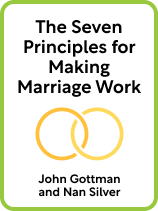

This article is an excerpt from the Shortform book guide to "The Seven Principles for Making Marriage Work" by John Gottman and Nan Silver. Shortform has the world's best summaries and analyses of books you should be reading.
Like this article? Sign up for a free trial here.
What’s the key to a successful marriage? What do happily married couples do differently?
According to relationship researcher John Gottman, the foundation of a successful and emotionally fulfilling marriage is marital friendship. If your marriage lacks this foundation, it’s only a matter of time before cracks begin to appear.
Here’s how to have a successful marriage, according to Gottman and Silver.
Why Improving Your Marital Friendship Is the Key to Marital Happiness
In The Seven Principles for Making Marriage Work, John Gottman (co-authored with Nan Silver) explains how to have a successful marriage, drawing from his research findings at the Love Lab, a laboratory at the University of Washington in Seattle devoted to deciphering the secrets of happy couples. The authors argue that if you want a long-lasting and happy marriage, you must improve your marital friendship. In other words, you and your spouse must hold each other in high esteem and genuinely appreciate the time you spend together.
(Shortform note: A 2014 study supports Gottman and Silver’s contention that a strong marital friendship improves your relationship: People who considered their spouse their best friend were more satisfied with their lives than those who did not. However, this finding was sex-dependent; women married to their best friends were much more satisfied than men married to their best friends.)
Gottman and Silver explain that a strong marital friendship supports a happy marriage because it encourages a phenomenon known as “positive sentiment override,” or PSO. If you have PSO, you trust that your partner is doing their best and assume that they have positive intentions. So you interpret your partner’s actions in the best possible way—which maintains positivity in the relationship.
But if you don’t have a strong marital friendship, you may experience the opposite of PSO: “negative sentiment override,” or NSO. If you have NSO, you assume that your partner is sabotaging you and has negative intentions. NSO leads you to interpret your partner’s actions in the worst possible way—fostering a negativity that permeates and ultimately destroys your relationship.
(Shortform note: You may be more prone to having NSO take over your relationship if you’re insecure. In one study, couples were seated back to back and told that they were doing the same exercise; in reality, one person was asked to list everything in their house while the other was asked to list what bothered them about their partner. The partner who listed what bothered them typically listed just one or two things and finished earlier; if they were secure, they weren’t too bothered to hear their partner listing things long after they were done. In contrast, insecure partners were greatly affected by their partner’s perceived criticism of them; they rated their relationship more negatively after hearing their partner scribbling away.)
(Shortform note: “Positive sentiment override” and “negative sentiment override” can apply to relationships outside of your marriage, too. At work, NSO can harm your team: If you consistently expect the worst from your team members, they won’t do their best work. Conversely, PSO increases productivity: Expecting the best from your team members encourages them to do their best work.)

———End of Preview———
Like what you just read? Read the rest of the world's best book summary and analysis of John Gottman and Nan Silver's "The Seven Principles for Making Marriage Work" at Shortform.
Here's what you'll find in our full The Seven Principles for Making Marriage Work summary:
- Why becoming genuine friends with your spouse is essential
- Four principles for improving your marital friendship
- The three warning signs that your marriage is in trouble







Yes, I Agree appreciating each other & spending time together is the key.